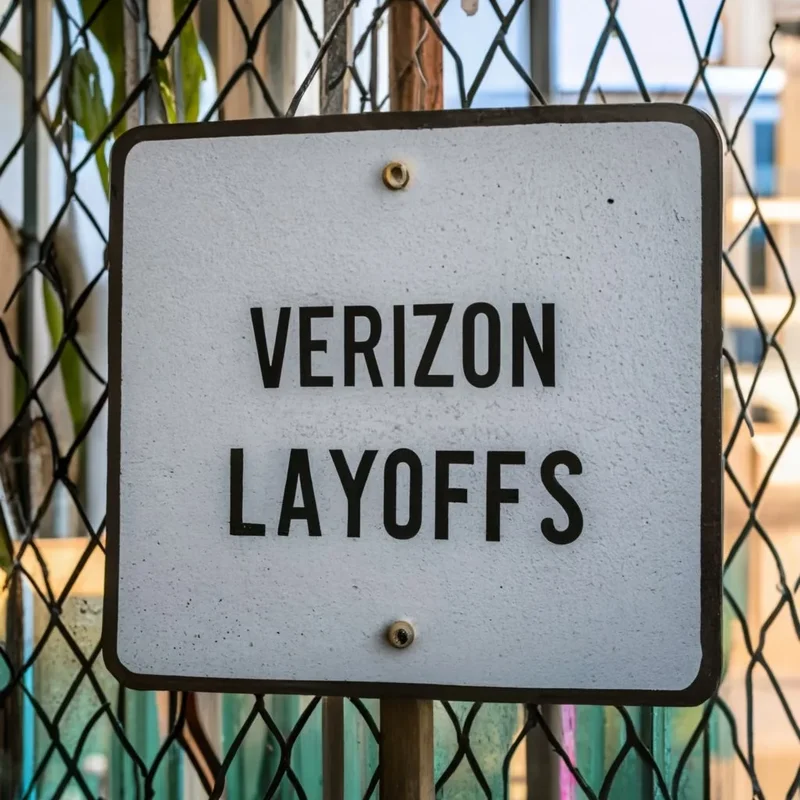Article Directory
Title: Verizon Layoffs: A Canary in the Coal Mine, or Just Corporate Pruning?
The recent wave of layoffs, particularly at Verizon and other major corporations, has sparked concerns about the overall health of the labor market. Are these isolated incidents, or a sign of deeper economic trouble brewing? Let’s dissect the numbers and see what they tell us.
The Layoff Landscape: A Closer Look
Verizon's announcement of over 13,000 job cuts (some reports initially suggested 15,000, but the final number was slightly lower) is certainly eye-catching. But context is crucial. Verizon claims these cuts are part of a restructuring effort to simplify operations and reduce costs, rather than a direct response to, say, AI stealing jobs. CEO Dan Schulman stated the company wants to "reorient our entire company around delivering for and delighting our customers," which sounds like standard corporate speak. Verizon Layoffs: US wireless announces more than 13,000 job cuts to shrink costs
However, the timing is interesting. These layoffs coincide with similar announcements from Amazon (14,000 corporate employees), UPS (cutting 14,000 management and 34,000 operational roles), and other large companies. While each company has its own specific reasons, the overall trend suggests a broader slowdown. The Bureau of Labor Statistics (BLS) data for August shows about 163 million people employed nationwide. So, even tens of thousands of layoffs represent a small fraction of the total workforce, as Indeed Hiring Lab economist Cory Stahle points out.
But here's the rub: the BLS also issued a sharp downward revision of its job totals for the 12 months ending in March, reducing the estimated job gains by 911,000. That's a significant discrepancy, and it suggests the labor market might not be as robust as previously thought. It’s like finding out your bank statement had a major error; you thought you had more savings than you did.
AI, Automation, and the Future of Work
The elephant in the room is, of course, artificial intelligence. Several companies, particularly in the tech sector, have cited AI as a factor in their layoff decisions. While the immediate impact of AI-related job losses may be limited, the potential for future disruption is substantial. Ioana Marinescu, a labor economics professor at the University of Pennsylvania, notes that AI-related job losses haven't been seen at scale yet, but it’s something to watch.

Verizon, however, denies that AI is the cause of these job cuts, even establishing a $20 million career transition fund to help laid-off employees acquire skills "as we enter the age of AI." This is a classic hedge. They're saying it's not about AI, while simultaneously preparing for a future dominated by AI.
I've looked at hundreds of these corporate statements, and that kind of carefully worded ambiguity always raises my eyebrows. It's like a magician saying, "I'm not using smoke and mirrors," right before pulling a rabbit out of a hat. The key question is: what percentage of the 13,000 laid-off employees will be retrained and redeployed in roles related to AI? And what roles are those, exactly? Details remain scarce, which is precisely why skepticism is warranted.
The Data Delay and the Fog of Uncertainty
A significant challenge in assessing the current situation is the delay in the release of government hiring data. The weeks-long delay in the government’s release of gold-standard monthly hiring data creates a “fog,” as ABC News put it. Should recent layoffs at major companies worry you? Experts weigh in This makes it difficult to get a clear picture of the labor market's true condition. We're essentially flying blind, relying on anecdotal evidence and corporate pronouncements, which, as we've seen, can be misleading.
The unemployment rate has remained low, which is a positive sign. But unemployment figures can be a lagging indicator, only reflecting the situation after a downturn has already begun. We need more timely and accurate data to make informed judgments.
So, What's the Real Story?
The Verizon layoffs, along with similar announcements from other major companies, do signal a slowdown in the labor market. While it's not time to panic, it's time to pay attention. The downward revision of previous job gains, combined with the uncertainty surrounding AI's impact, paints a concerning picture. The lack of timely data only exacerbates the problem. It all suggests that the economy is going to get worse before it gets better.
